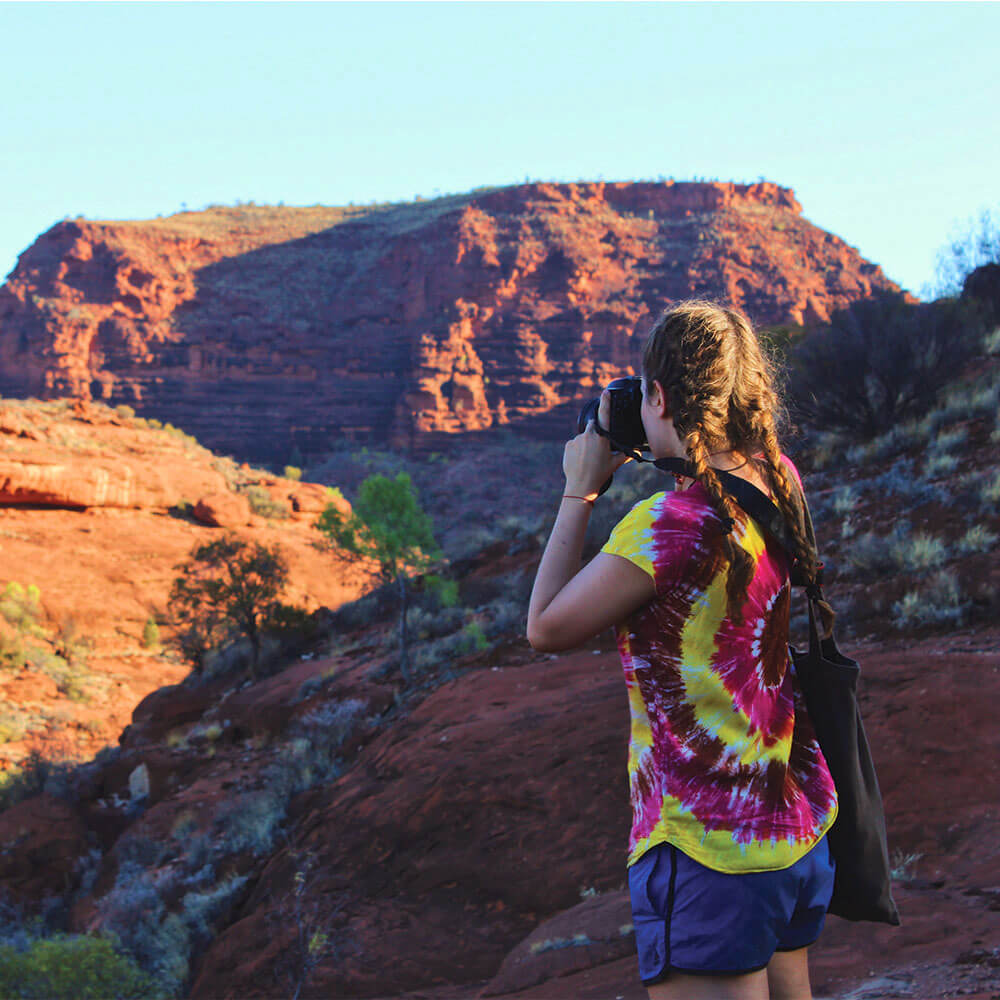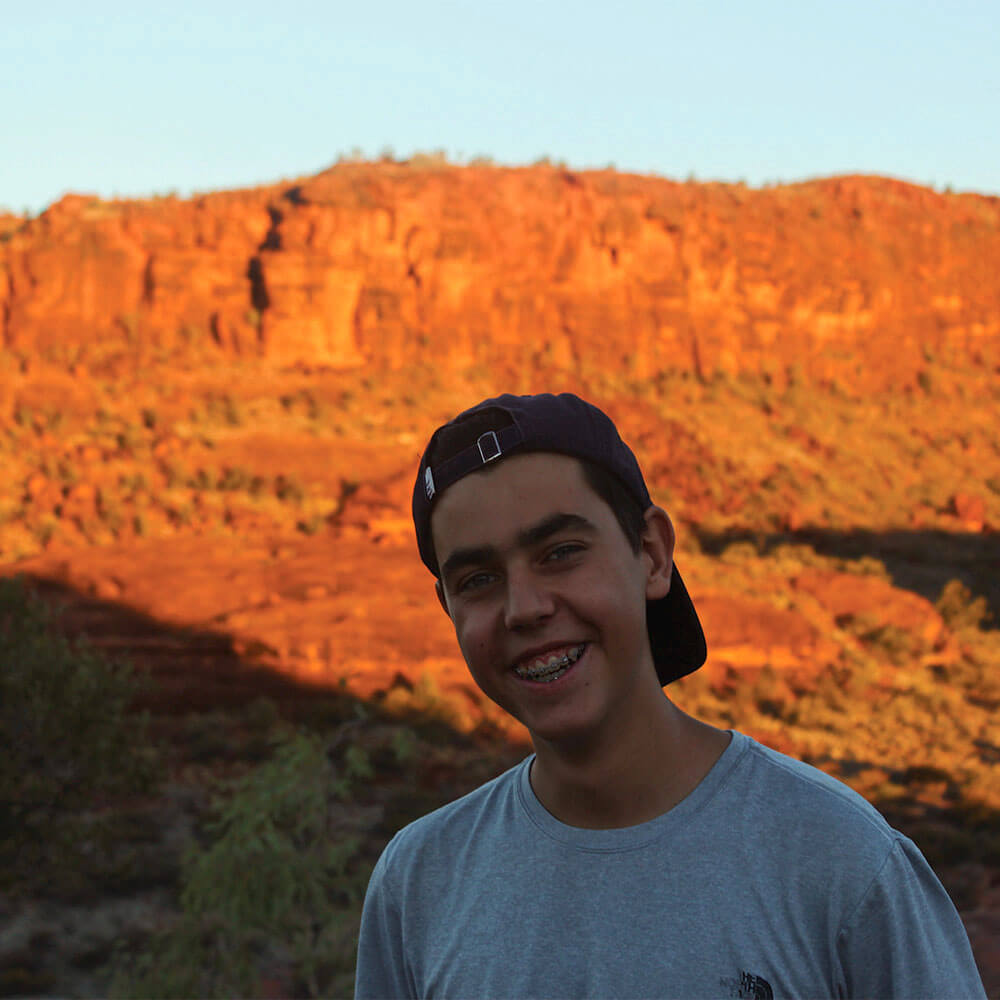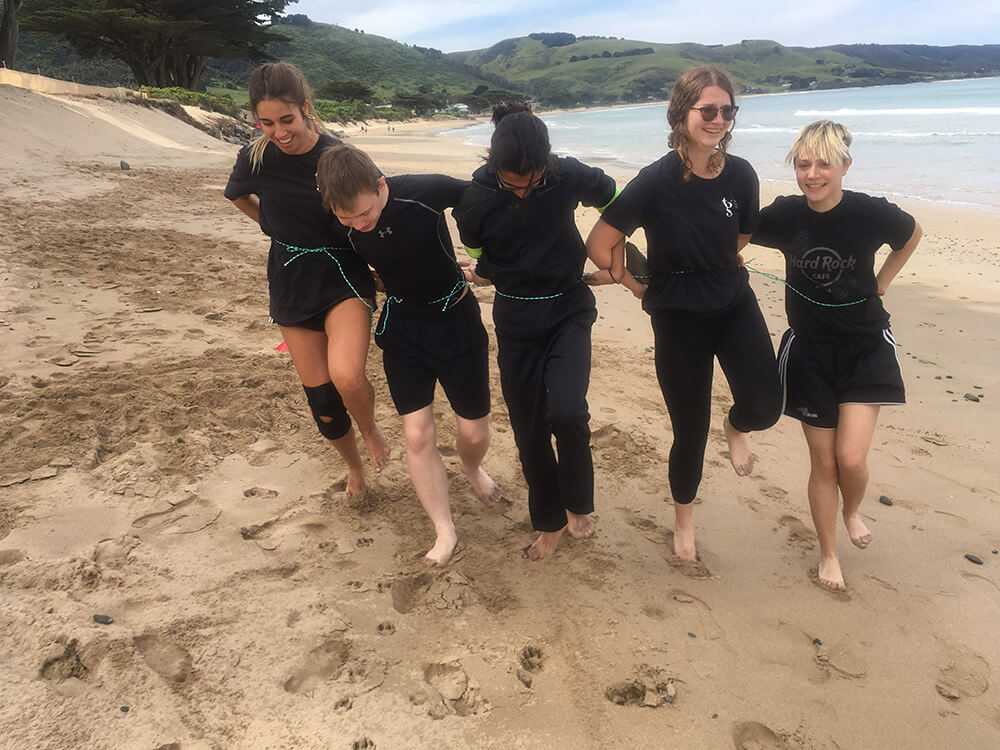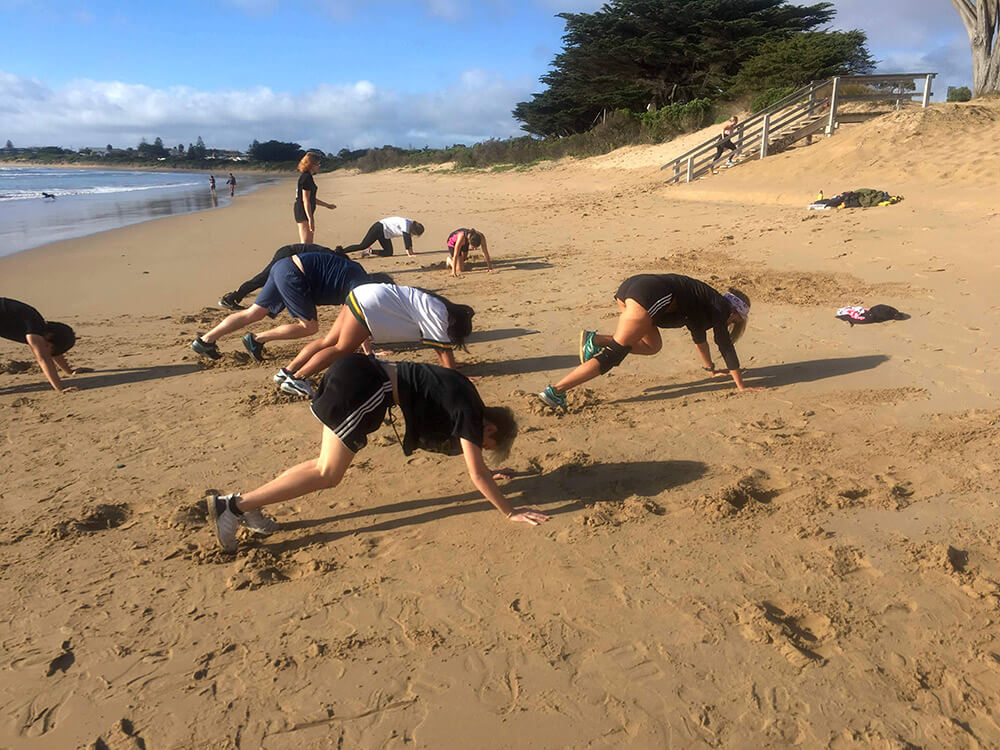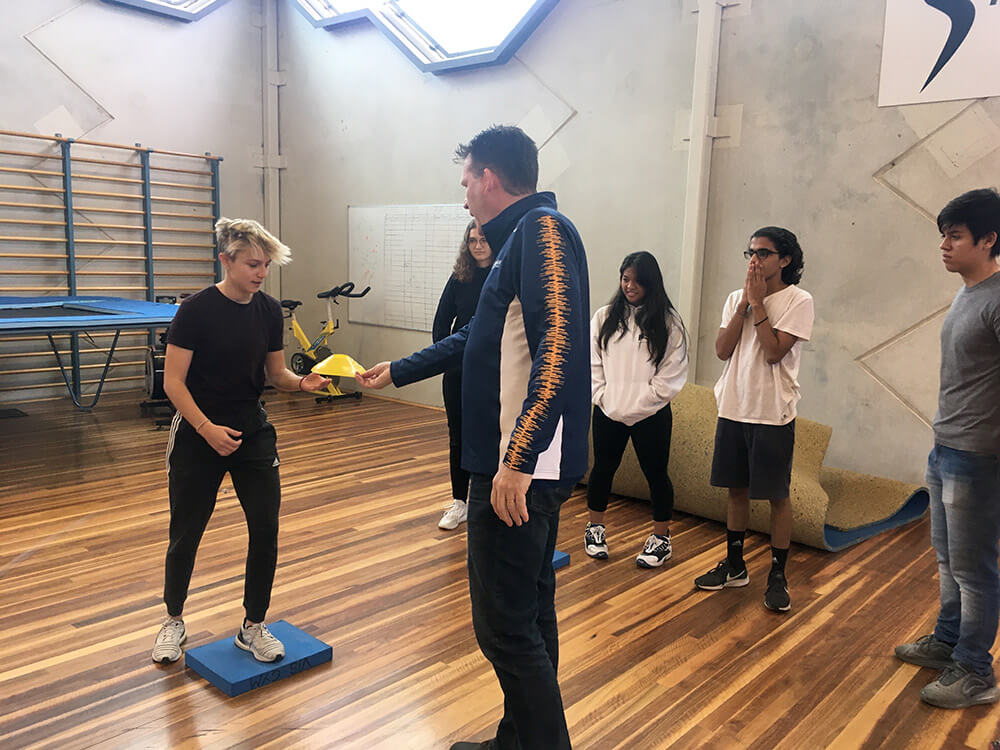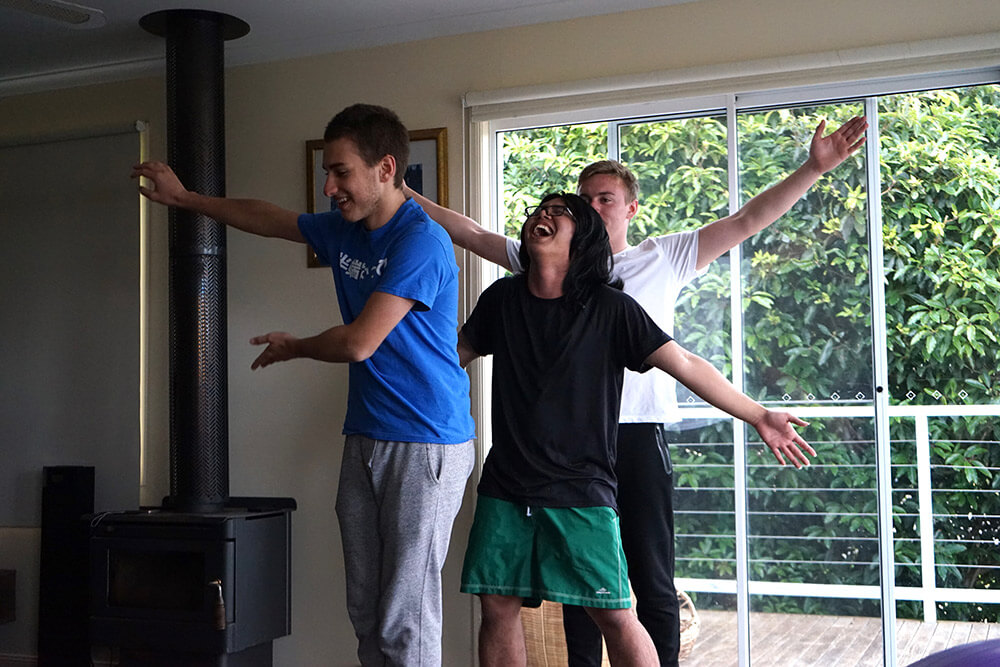1) Hi Nada, can you tell us what you've been up to since graduating from THINK Global School in 2022? Since graduating in 2022, I've been pursuing a passion I found while at TGS, sustainability, and I am currently majoring in engineering in renewable energy systems at Al Akhawayn University, in Ifrane, Morocco. But there is way more than that! I've had a chance also to explore the world of...
Read MoreThis fall our CM1 students traveled down under to Melbourne, Australia, for their term in one of the world’s most livable cities. Known for its dynamic art scene, ethnically diverse restaurants, and fervent love of all things sports, adding multicultural Melbourne to our travel calendar was a no-brainer. Best of all, visiting between the months of October and November promised springlike weather throughout the duration of our stay.
Viktoria L, class of 2022 said, “I really loved Australia, because it was very comfortable here. We had modern accommodations and learning spaces plus an awesome opportunity to explore the city through eating meals in different places.”
Students began the term with a Masterchef cooking competition where, like the popular tv show, they were challenged to make healthy dishes within a set time period and the ingredients they were provided. Cooking, nutrition, and wellness all played an important role this term, and educators Chelle Marshall and Ibrahim Abu Atiya hosted regular cooking nights where participating students were matched with cooking partners based on compatible interests, diets, and skills. The students then had the opportunity to select recipes, shop for ingredients, cook and clean.
Fire Carrier Program
This term students also had the honor of being invited to FIRE Carriers, which is an acronym for Friends Igniting Reconciliation through Education.
The event provided an opportunity to continue learning firsthand about the overarching theme of their Bosnia & Herzegovina term: the process of reconciliation. This time, however, through the lens of Australia’s Aboriginal community.
The FIRE Carrier Program included guest speakers who explained the indigenous history of Australia while sharing their hope for a united future.

Speakers included Bill Nicholson, a Wurundjeri elder with over twenty years in the field of cultural education who led a smoking ceremony and welcome; Sherry Balcombe, a Western Yalanji, Djabugay / Okala native and coordinator of Aboriginal Catholic Ministry Victoria, who spoke on the history and significance of FIRE Carriers; Richie Williams, a Wiradjuri Didge player, poet and dancer; and Scott Darlow, a Yorta Yorta descendent who writes songs and stories on Aboriginal and Islander themes.
The event was hosted by Nillumbik Reconciliation Group and Catholic Ladies’ College in partnership with Aboriginal Catholic Ministry Victoria and Amnesty International.
Project-based Learning and weXplore Overview
Before the start of their Melbourne term, students opted to participate in one of the three following teacher-led modules: Activism for Equity and Social Justice; Barriers in Health; and Virtual Augmented Reality. Teacher-led modules give students the opportunity to focus on a topic relevant to the country they are inhabiting by answering a driving question through the form of a project. On top of these teacher-led modules, students also participate in a number of personal projects each term that provide them with the freedom to explore the topics and concepts they are passionate about. In both teacher-led modules and personal projects, students work in collaboration with educators and design their project work around a set of learning targets that are universal to all THINK Global School students. You can learn more about project-based learning at TGS here and learning targets here.
During the term, students embark on a weeklong journey outside of their host city. These excursions, which focus on place-based learning, are known as a weXplore. weXplores provides students with opportunities to get hands-on with their learning and gain a different perspective on the key concepts related to their module.
At the end of each term, students present what they have learned during the end-of-term showcase.
Below you can find more detailed information on each of this term’s teacher-led modules.
Activism for Equity and Social Justice
In the past few years, Australia has been making huge strides towards improving social justice through organizations, campaigns, and movements. Students participating in the Activism for Equity and Social Justice module had the opportunity to learn more about what this progress means for Australia and how it is addressing equity by answering the following driving question: “How might we design a culturally appropriate activist strategy to enhance equity in our home countries by applying insights from Australia?”
Besides observing firsthand how cultures come together and interact in Melbourne, students learned by engaging with speakers, meeting with organizations, and visiting museums to gain a sense of how Australia has made significant progress in social justice.
Students began the module with a guided walking tour of Melbourne to learn about its history and modern influences. As part of the THINK Local program, designed to allow students an opportunity to explore local culture and language, students broke into small groups to explore Melbourne’s art and museum scene. One group of students visited an interactive pop-up display called “A Mile in My Shoes,” where they exchanged their own shoes for another pair, put on a headset, and listened to the narrated stories of the person whose shoes they were walking in. Students discovered tales from all walks of life including an 81-year-old rower, a marine biologist, a Vietnam War veteran and even an English migrant with a fear of water.
A highlight of the term was a lecture from Dave Sweeney, a prominent anti-nuclear activist who works on anti-mining and anti-nuclear campaigns for the Australian Conservation Foundation. Sweeney spoke on his amazing work and how TGS students can develop effective strategic activism campaigns. His son, Mungo, who is an activist himself, also presented on his own activism. Gareth Manning, one of the educators involved in this module, described the experience as “utterly brilliant and an honor.”
For their weXplore, students embarked on a seven-day journey to Australia’s Northern Territory. During the journey they:
- Explored Alice Springs
- Received a guided tour of the West MacDonnell Ranges National Park, home to the Western Arrernte Aboriginal people for tens of thousands of years
- Continued on to Ikunji, a part of the West McDonnell Ranges with breathtaking views and landscapes that is also home to the Luritja and Pintupi Aboriginal people. Students enjoyed a variety of nearby natural landscapes, experienced local art, and ventured around the community.
- Spent time with local families at Palm Valley and learned about local bush tuckers, the food used by Australia’s original population for sustenance
Reflecting on the weXplore, Class of 2022 student Effie shared, “My favorite experience was days 4-5 because we got to spend time with Aboriginals and learn about their culture and personal history. It’s something you can’t just read online — you need to experience and talk to them in person to understand the vastness of the issue at hand.”
Summative Assessments and Learning Targets
During this module, students concentrated on increasing their knowledge in the following learning targets and 21st-century skills:
- Critical Thinking
- Effective Communication
- Global Awareness
Students were challenged to grapple with complex concepts related to power, inequity, and oppression and their real-world manifestations in Australia, as well as their home country context. They were assessed by a range of activist strategies for advancing positive social change along with designing an approach to promote social justice in their home country by applying insights gained through research and learning experiences while in Australia. They also reflected on their own intersectional identities, including areas of privilege and disadvantage, and how their social positionality informed their approach.
Project Outcomes
For the final product, students had the option to present their research in their preferred form of medium including videos, songs, organizations, websites, presentations, workshops, protests, etc.
- Class of 2020 student Charlotte S. did a presentation focused on canceling the North Dakota Access Pipeline (DAPL) to avoid possible future water pollution and the destruction of sacred sites. She explains the three major objectives to make this happen: (1) Make DAPL a 2020 election issue (2) combat environmental racism by changing the narrative (3) have breakthrough conversations about the issue in schools.
- Class of 2020 student Ina B. presented on the issue of wild rivers being destroyed by the construction of dams. She explains how dams not only destroy rivers but result in the loss of aquatic and terrestrial biodiversity, damage livelihoods, and force people to move. The three objectives to help fix this issue are: (1) Building support and awareness for this issue and movement (2) Cancelling the construction of the Kalivac Dam on the Vjosa River, which is one of Europe’s last wild rivers. (3) Declaring the Vjosa River as the first wild river national park in Europe.
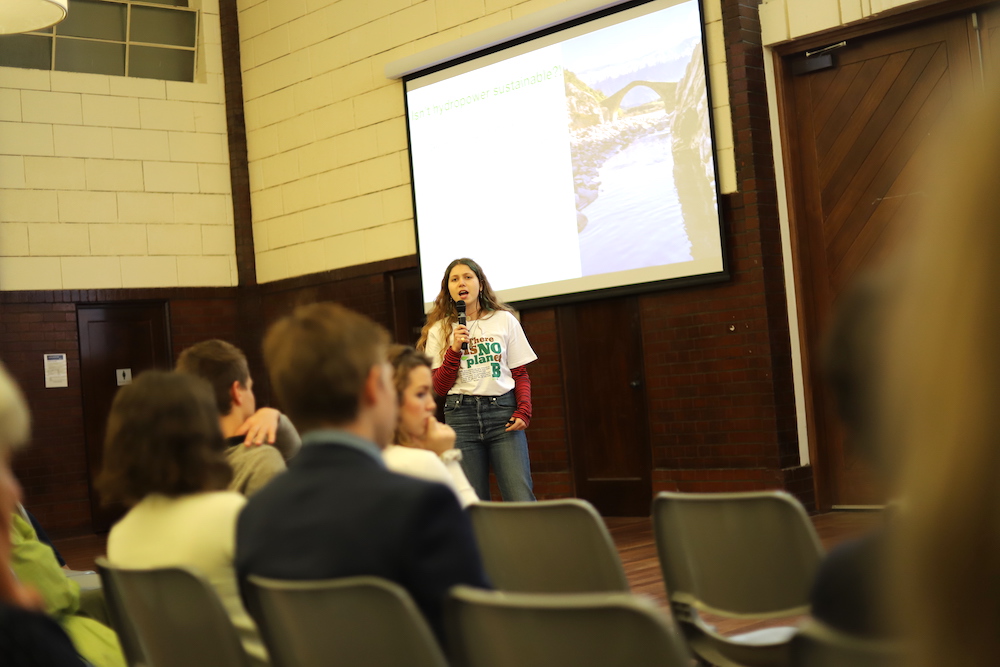
Ina presents during the showcase
- Class of 2022 student Ignacio C.’s project focused on the question, “How can I utilize design technology to create a feasible and environmentally sustainable ship design?” Ignacio used both the concepts of design theory and naval architecture to guide him in designing a sustainable ship plan that could be theoretically built.
- Class of 2020 student Jess P.’s projected discussed the issue of the gender market in South Africa and the discrimination associated with it. She mentions how on legal documents and forms the only option is female or male and if you want to identify as something else or a different gender you have to have medical procedures to change your gender. In Jess’s eyes, this is extremely unfair and problematic because a lot of people either don’t have the money to do so or don’t want to. Jess wants to change this law and plans to pair with other organizations working to change this.
- For his personal project Class of 2022 student Guillermo H. focused on creating original art pieces inspired by aboriginal art. He does so by using symbols and dot painting, with the pieces representing the different communities he is part of.
- Effie’s project focused on Finland’s fur industry and the union that is supposed to protect the animals. She says that the union appears to be great, but in reality, has many loopholes. She explains the steps needed to protect animals including spreading advocacy through videos and social media. She plans to gain 50,000 signatures over the course of six months so that she can be heard in parliament and gain allies for the cause.
Breaking Barriers in Health
The module Breaking Barriers to Health focused on using the expertise of Australia’s huge sporting industries to build a health initiative for a target group in need. Students were asked to answer the driving question: How can we take lessons from the sports industry to better improve the health of a specific group in need?
The module began with participants identifying various target groups within their own home community whom they could help, including teens struggling with obesity, malnourished children, people undergoing cancer treatment, people struggling with anxiety, and people dealing with type 2 diabetes.
For the module, students also set personal fitness goals that they would like to achieve over the course of the term.
Students learned from different specialists within the sports industry on how to develop a personal health and fitness plan. In turn, they spent time examining the potential impacts of what they learned through this experience by applying its benefits to people on an individual level and to the specific group they had identified within their home community.
At the Victoria Institute of Sports, students were led by speakers through a variety of interactive workshops. These included deep dives into sports psychology, strength-and-conditioning, sports science, diet and nutrition, and physiotherapy.
Guest speakers included:
- Sports Psychologist Caroline Anderson. Anderson helps people overcome injuries and retirement.
- Sports Scientist Alex Bauer. Bauer gave an overview of sport science and explained different types of fitness testing.
- Nutrition Specialist Brittany Andreola. Andreola focuses on fueling and recovery. She explained the importance of nutrition and how to effectively eat healthy.
- Strength and Conditioning Specialist Erin Clancy. Clancy plans training programs for athletes to develop certain muscle groups they need to work on. Clancy showed the students some drills and warms up along with fitness testing equipment.
The concepts they learned during these workshops where then able to be applied to the major concepts of the module such as fitness, injury, and prevention as well as the student’s personal fitness goals.
For their weXplore, students went on a retreat in Northeast Australia to work on and deliver workshops in each student’s fitness area. During this weXplore students learned a variety of different health and wellness tactics and activities.
Learning Targets
During the Barriers in Health module, students concentrated on increasing their knowledge in the following learning targets and 21st-century skills:
- Processing and Comprehending
- Active Literacy
- Scientific Concepts
- Well-being
- Future Planning
Project Outcomes
For their final project, students individually set goals and maintained a training journal (vlog) showing their transformational journey to go alongside the initiative they developed to address a health and wellbeing issue for a specific group within their home community. These projects were then presented at the end-of-term showcase.
- For her module work, Class of 2021 student Gabi C. explained the connections between symbolic violence, dominance, state intervention, and language deprivation and the effects they have on deaf children, focusing on the language deprivation faced by so many deaf people within her home community and around the world. For her summative assessment, Gabi wrote a paper in which she used content analysis to analyze public policies and laws that affect the deaf community and their effectiveness in helping the deaf with the struggles they face.
- Class of 2020 student Paula M.’s project covered pole dancing and fitness. She created a website to discuss what pole dancing is including the physical and mental aspects of the activity. She then discusses on her website how pole dancing is a form of classical dance but can have a negative stereotype in Mexico due to its associations with sexual violence and negative body image, when really it should be a form of female empowerment.
- Class of 2021 student Gigi designed her project on Australian slang and how it has become a part of the country’s identity. Her goal was to become competent and confident in communicating slang with the local community. She demonstrated this by creating a mini dictionary documenting Australian slang terms she learned through interactions with the local community.
- Class of 2022 student Matvey I. directed a movie about the victim of the stolen generation who comes to Melbourne and starts seeing dreams about his connection to the land.
- Class of 2020 student Julia G. focused on advocacy and graphic design by designing and printing a series of stickers and badges. These were then sold at the showcase with the profits being donated to the Black Rainbow organization, which supports suicide prevention within Australia’s indigenous LGBTQ community.
Virtual – Augmented
Virtual and Augmented reality has moved beyond fad status and is becoming a real game-changer in a large number of industries, from advertising to medicine. We only have to look at the popularity of apps like Pokemon Go to see the potential of these technologies in creating awareness. In this module, students worked as a team alongside a local media company to create a mixed reality app for a local small business. Through this process, students developed an understanding of the human-centered design cycle in order to translate the goals of a client into a VR product that connects with the intended audience.
The driving question of the module was: “How can we design and create a mixed reality experience which meets the needs of a client and their target audience?”
For their weXplore, students traveled to Apollo Bay for a well-deserved break, where they focused on wellness activities like surfing and kayaking.They also traveled to a nearby farm to learn about Australia’s farming industry and to document the animals and plants they came across for future use as inspiration in the mixed reality application they were developing for their project.
Project Outcomes
Students participating in the Virtual and Augmented Reality module developed an XR app to address issues raised by existing small businesses, non-profit organizations, and charities, with the app being designed around the specifications raised by the client they were partnered with.
They came up with an “X-cake minisport,” an augmented reality game that encourages physical literacy in unconfident youth. The game involves trying to catch flying pancakes with a pan and takes 360 video games in real life.
Class of 2020 student Amelie A. designed an experiment kit for eleven to fourteen year-olds focused on astrobiology, an interdisciplinary scientific field concerned with the origins, early evolution, distribution, and future of life in the universe. The kit came with a basic information book discussing this subject.
Watch the showcase in its entirety
If you enjoyed learning about the modules our students completed during their time in Australia, we encourage you to watch their project-based learning showcase in its entirety. The event also includes a look at personal projects developed during our time in Australia.





